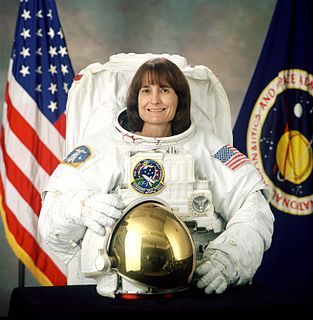A Quote by Linda M. Godwin
We launch when we're kind of in the same orbit that they are in terms of being matched up in inclination in space, and we're just in a little different altitude.
Related Quotes
The United States, Russia, and China are the only three countries in the world that can launch astronauts into space. Mostly in the U.S. you see some companies trying to launch private commercial people into space, but nobody's done it yet. The only private vehicle that's made it into space so far is Spaceship 1 in 2004, and that was an effort that was funded by one of the Microsoft founders, and he spent about $20 million to develop this spacecraft to do a sub-orbital flight. And it's not the same as going into orbit, but it was a huge first step.
To allow public access to orbit, we would need breakthroughs that would lower the cost by a lot more than an order of magnitude and increase safety by a factor of 100 as compared to every launch system used since the first manned space flight. I think airborne launch will be a significant part of the safety solution.
I'd like to reiterate that the opportunities in space are going to be vastly different than they've been before, so, for young Canadians preparing for their futures, it's important to understand that there are going to be many opportunities to work in either new space industries that are being developed or to actually go to space, to be one of the people to join our team of explorers who are going to leave lower-Earth orbit. That, ultimately, is amazing, the opportunities we'll have.
Even in relativity theory even though you can analyze space - time in terms of this four-dimensional geometrical structure one of the dimensions is different. And this shows up in the equations. It has a different sign - rather than plus it shows up as a negative minus. So even in relativity theory time is distinct from space in terms of the way in which these dimensions manifest themselves in the equations.
The expense of getting into space is the rocket launch, the rocket itself. Rocket's right now, commercial rockets cost probably somewhere between $50, or $120, or $150 million per launch. And those are all expendable. That is, you've got to buy a new rocket for each launch. So, that really is the critical part. If there was some kind of really, a revolutionary breakthrough and the price of rockets fell by an order of magnitude, I mean, just imagine what that would do as far as getting access to more ordinary people.
We will eventually build space science labs and hotels, prodding the capability for missions beyond the orbit of the Earth. Our space-hotel guests will be able to take breath-taking excursions, flying a couple of hundred feet above the Moon's surface in small two-man spaceships. In time, we will launch missions to Mars and beyond.
We may think that justice is everyone being equal, having the same rights, sharing the same kind of advantages, but maybe we have not had the chance to look at the nature of justice in terms of no-self. That kind of justice is based on the idea of self, but it may be very interesting to explore justice in terms of no-self.
Most Jupiter-sized planets orbit the mother star in a highly elliptical orbit. This means they will often cross the orbit of any Earth-like planet and fling it into outer space, making life impossible. But our Jupiter travels in a near-perfect circular orbit, preventing a collision with any Earth-like planet, making life possible.
For the last several years and culminating in six months in orbit next year, I've been training for my third space flight. This one is almost in a category completely different than the previous two, specifically to live in on the space station for six months, to command a space ship and to fly a new rocket ship.



























